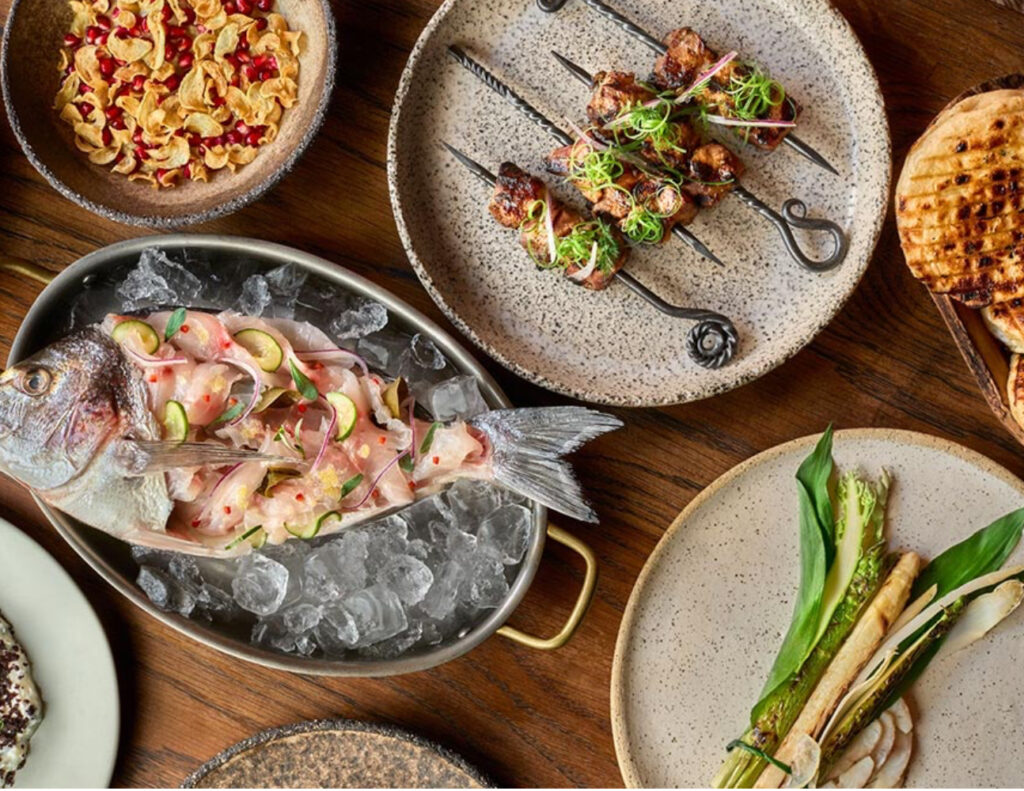In the pithy of London’s Southwark Street—where market footfall meets cosmopolitan appetite—an ancient spirit of hospitality is being revived. Greek chef Yiannis Mexis, born between the cerulean whispers of Mykonos and the marbled grandeur of Athens, has opened Pyro, a soulful taverna that channels his heritage into a contemporary, open-air dining experience. But this is not just another Greek restaurant in a foreign city—it is a ritual, a Sunday feast, and a deep, sustained exhale in a city that rarely slows down.
Mexis’s background is essential to understanding the restaurant’s conceptual DNA. Raised amidst the culinary dialects of Greece’s island and mainland traditions, he approaches food not as a product to be plated, but as a lineage to be protected. “In Greece, the kitchen is the altar,” Mexis says. “It’s where everything starts. Stories, family arguments, new beginnings—it all happens with a bowl of olives, a dish of saganaki, or a glass of wine in hand.”
A Taverna in a Time of Transit
Located at 53B Southwark Street, Pyro emerges as both refuge and celebration. Its design is tactile and sun-kissed—burnished plaster walls, matte terracotta tiling, reclaimed wood accents, and airy linen drapes that billow like sails caught in the Aegean wind. But the true theater lies in the open kitchen, where fire and aroma do the speaking. There’s no culinary gimmickry, no over-elaborated concepts. Just flame, honesty, and a fidelity to flavor.
On weekends, Pyro transforms into a proper Greek gathering. Sunday feasts spill out onto the restaurant’s sun-dappled terrace, a semi-enclosed courtyard that feels more like a Cycladic patio than a South London sidewalk. There, long communal tables welcome families, locals, visitors, and the occasional homesick Greek expat, all brought together by a spread that demands slowness and sharing.
The Menu: A Study in Provenance and Presence
Every plate at Pyro tells a story. Not in the over-wrought, metaphor-laden way often found in high-concept fine dining, but in the straightforward warmth of familiarity. The ingredients are hyper-seasonal and primarily sourced from British smallholders, but the flavor language remains unmistakably Greek. It’s not fusion; it’s translation.
Take the mussel saganaki, for example—plump, briny mussels bathed in a tomato base that’s been reduced down with ouzo and chili, then topped with sharp crumbles of feta, blistered under flame until bubbling. Served with toasted sourdough from a local Bermondsey bakery, it’s both Greek in intention and London in footprint.
The charred aubergine with smoked mizithra is another standout. The aubergine, blackened and blistered, rests in a shallow pool of stewed tomato, oregano, and olive oil—a nod to imam bayildi—while the smoky mizithra, a soft white whey cheese rarely seen outside Greece, lends a pungent contrast. Here, texture and taste converge: the creamy collapse of aubergine, the acid pop of tomato, the slight crunch of toasted pine nuts scattered like punctuation marks.
Other dishes include spanakopita—that classic spinach pie—but elevated through subtle precision. The phyllo is paper-thin, hand-brushed with herbaceous olive oil, and folded around a filling rich with dill, leeks, fennel, barrel-aged feta, and sorrel. It’s not overly salty or greasy—just crisp, aromatic, and full of vegetal warmth.
The Role of Bread, Oil, and Wine
In Greek tradition, no meal is ever complete without bread, oil, and wine. At Pyro, these are not afterthoughts—they’re the prologue. The bread comes in baskets, warm and uneven, as if baked by someone who doesn’t own a ruler. The olive oil is dark green and peppery, poured generously. And the wine list, curated personally by Mexis, focuses on small-production Greek vineyards: Assyrtiko from Santorini, Xinomavro from Naoussa, and a particularly vibrant Roditis from the Peloponnese.
Each bottle is introduced with quiet pride by the servers, who all seem to share Mexis’s philosophy. They’re not in a rush. They want you to know what you’re drinking. They want you to linger.
Sunday as Ritual, Not Recovery
While many restaurants use the weekend to push brunch culture, Pyro leans into something older. Its Sunday Feast is neither mimosa-fueled nor plated for Instagram. Instead, it’s built on the premise that food can re-order the chaos of the week, not just punctuate it.
There’s roasted lamb with lemon potatoes. A massive communal plate of horiatiki (Greek village salad), topped with slabs of feta and kalamata olives. Roasted red peppers stuffed with rice, pine nuts, and cinnamon. And a fig tart with thyme honey and a splash of Tsipouro to finish.
Live bouzouki music occasionally fills the terrace. Children play at the edge of tables while their parents lean in over wine and bread. It’s a moment where the tempo of Athens’ Plaka district seems to transplant itself directly into Borough.
A Rejection of Pretension
What distinguishes Pyro from London’s burgeoning Greek food scene is its refusal to upscale itself beyond recognition. Too often, Greek cuisine abroad becomes victim to refinement—its rusticity sterilized, its soul drained in the name of minimalism. Mexis doesn’t play that game.
Instead, his approach is to refine without reducing. The dishes are plated beautifully, but with a tactile casualness. The tableware is mismatched in tone but not in quality. There’s linen, but not starch. Everything feels tactile, elemental.
There’s also no faux-folklore. No broken plates, no blue-and-white clichés. The Hellenism on display is lived, not performed. And that authenticity resonates more deeply than any aesthetic replication of a Mykonos postcard.
Pyro and the Geography of Memory
Food, especially diasporic food, is a medium of memory. At Pyro, this becomes unmistakably clear. Each dish is a waypoint in Mexis’s personal map: the taste of his grandmother’s kitchen in Thessaloniki, the sea-wind scent of Mykonos fish markets, the aroma of garlic and lemon on a Sunday afternoon in Athens. And through that, he offers a path for others to remember or imagine their own culinary homeland—be it Greek or otherwise.
There’s an element of resistance here too. Against homogenization, against the idea that all cities eventually flatten into the same culinary patterns. Pyro insists on specificity, on the strength of a place expressed through palette.
The Fire Behind the Name
The restaurant’s name—Pyro—is no mere aesthetic choice. It refers to the literal fire of the kitchen, yes, but also to the metaphorical blaze of origin, transformation, and persistence. In Greek, “πῦρ” (pyr) is a sacred force, used to forge metal, cook food, and cleanse altars. At Pyro, that ancient meaning is subtly resurrected.
You taste the fire in the scorched skins of tomatoes, in the toasted barley rusk under a Dakos salad, in the char of the grilled octopus. But you feel it, too, in the hospitality—the fire of welcome, of unguarded generosity.
Impression: A Home Worth Returning To
In a city with no shortage of culinary distractions, Pyro offers something rarer: a center of gravity. It invites you not just to eat, but to gather. Not just to taste, but to remember. It’s not about trend-chasing or award-winning; it’s about presence. And perhaps that’s the most radical thing a restaurant can do right now.
Yiannis Mexis hasn’t just opened another spot on the Southwark circuit—he’s created a hearth. One where plates are passed before menus are read, where names are learned, and where strangers become guests, then family.
And that, in the truest sense of the word, is philoxenia—the ancient Greek art of loving the stranger. A feast of fire, memory, and generosity.
Pyro
53B Southwark Street, SE1 1RU, London
Open Tuesday to Sunday
Sunday Feast: 12 PM – 5 PM
Reservations: [More info available via Pyro’s official website or @pyrolondon on social platforms]
No comments yet.








